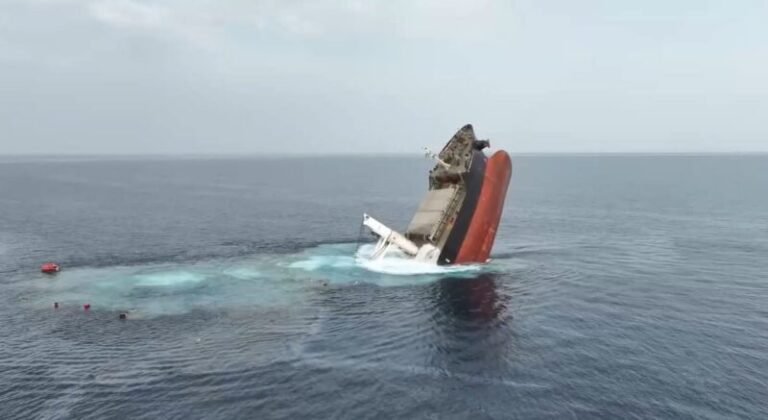The bulk carrier Eternity C, a Liberian-flagged vessel owned by a Greek company, has sunk in the Red Sea after a violent attack by Yemen’s Houthi rebels. The assault, which occurred early Wednesday morning, left at least three crew members dead and 19 others missing. Only six of the 25 people on board were rescued, according to a European naval force operating in the area. The incident is being described as one of the most severe maritime attacks by the Iran-backed Houthi group since they began targeting commercial vessels in late 2023.
The Eternity C was on a commercial voyage through the Red Sea, a critical global shipping route that once handled $1 trillion worth of cargo annually. The vessel was not under naval escort at the time of the attack, which made it particularly vulnerable. The ship came under a multi-pronged assault involving rocket-propelled grenades, small arms, two drones, and two bomb-laden drone boats. After hours of sustained damage, the ship began taking on water through holes in its hull and finally sank at 7:50 a.m. local time.
The crew included 22 sailors—21 from the Philippines and one from Russia—along with a three-person security team. Rescue teams managed to save only five Filipino sailors and one Indian national. The identities of the deceased have not been released, and efforts are still ongoing to locate the 19 missing individuals. One of the rescued crew members reportedly had to undergo leg amputation due to injuries sustained during the attack.
Videos released by the Houthis show the ship under intense fire, with oil visibly leaking into the sea and the bridge heavily damaged. The rebels can be heard chanting anti-American and anti-Israeli slogans in the footage. These recordings bear similarities to videos shared after previous attacks, including one on the vessel Sounion in August 2024.
The Eternity C attack follows closely behind the sinking of another bulk carrier, the Magic Seas, which was also hit in a similar assault. These back-to-back incidents have alarmed shipping companies and disrupted efforts to resume normal cargo operations in the Red Sea, a route many had begun to use again following a brief pause in Houthi aggression.
The Houthis claim that their attacks are in support of Palestinians in Gaza. Their campaign paused briefly during a ceasefire in the Israel-Hamas war but resumed after U.S. airstrikes hit Houthi positions earlier this year. A Houthi military spokesperson, Brigadier General Yahya Saree, took responsibility for the Eternity C attack and justified it as part of their ongoing campaign.
The Philippines’ Department of Migrant Workers is coordinating with the families of the missing sailors and providing both emotional and logistical support. Officials are also pressing for increased international efforts to protect seafarers operating in the region. The U.S. State Department has condemned the attack, calling it a serious threat to both regional stability and international shipping.
The incident has intensified concerns not only about human loss but also environmental damage. Oil leaking from the ship could pose long-term harm to the already fragile marine ecosystem of the Red Sea. Security analysts also note that the escalation puts added strain on global trade, which is already dealing with other geopolitical disruptions.
The region remains tense as military responses and retaliatory actions continue. Israel recently bombed three Yemeni ports under Houthi control, including Hodeida. Satellite images show parts of the Hodeida pier destroyed, potentially disrupting food and aid deliveries. Israel claims the port has been used to smuggle weapons, while the Houthis argue that aid shipments continue and blame the destruction on Israeli airstrikes.
The Eternity C tragedy highlights the vulnerability of commercial shipping in conflict zones and raises questions about the effectiveness of current maritime security protocols. With tensions showing no signs of easing, the Red Sea continues to be a high-risk zone for both cargo ships and the international crews that operate them.







